Table of contents
Appearance details
Date: Monday, April 4, 2022
Location: Malone Room, National Defence HQ
Time: 2:00 to 4:00 p.m.
Appearing:
- Hon. Anita Anand, P.C., M.P., Minister of National Defence
- Shelly Bruce, Chief, Communications Security Establishment
- Bill Matthews, Deputy Minister of National Defence
- Gen Wayne D. Eyre, Chief of the Defence Staff, Canadian Armed Forces
- Col Robin Holman, Acting Judge Advocate General, Office of the Judge Advocate General
Details: Committee has asked for briefing to discuss “general issues relating to national defence and security”. The Minister will appear for the first hour with officials appearing for the full two hours.
Minister of National Defence’s opening remarks
Event: Appearance at Senate Standing Committee on National Defence
Speaker: MND
Date: April 4, 2022 (TBC)
Themes: State of the World, International Ops, Support for People
Introduction
Mr. Chair,
Members of the Senate Standing Committee on National Defence,
Good afternoon.
When I was appointed Minister of National Defence, I was given a broad mandate to ensure the Department of National Defence, the Canadian Armed Forces, and the Communications Security Establishment are equipped to protect Canada and its interests, working closely with our Allies and partners across the globe.
The events of the past six weeks have made this work all the more urgent.
Russia’s unprovoked and unjustifiable war in Ukraine—and President Putin’s efforts to undermine the Rules-Based International Order—have reminded us that conflict is always closer than we may hope…
And underscored the fact that Canada’s geographic position is no longer the source of protection it once was.
We need the tools in place to safeguard our country and our continent, while making sure we’re ready to help our friends and Allies in crisis.
We need a well-equipped and well-supported military force, at a time when recruitment and retention have seen significant challenges.
I want to take a few minutes today to tell you about how we’re advancing these priorities.
And how we’re ensuring that Canada is ready to tackle our biggest defence and security challenges now, and into the future.
Importance of multilateralism
Canada’s Defence Policy Strong, Secure, Engaged, remains our roadmap for safeguarding our country and upholding peace and stability around the globe.
The Covid-19 pandemic and an evolving threat environment have adjusted some of our timelines, but our key priorities remain the same.
That includes our dedication to working with our closest Allies and partners in the name of global security and stability.
In fact, in a time of global uncertainty, we know our multilateral relationships are even more important.
In response to Russia’s attack on Ukraine, we’ve provided well over $100 million dollars in military aid to Ukraine, as well as significant financial and humanitarian support in conjunction with Global Affairs Canada.
We’ve also helped bolster Ukraine’s resilience in cyber space, in conjunction with CSE.
But our support for Ukraine’s security and sovereignty goes much deeper.
Following Russia’s occupation and illegal attempted annexation of Crimea, we launched Operation UNIFIER in 2015. Over the last seven years, we’ve worked with nearly 35,000 members of Ukraine’s security forces, including roughly 33,000 members of Ukraine’s Armed Forces, and 2,000 of their National Guard—training and learning valuable skills from one another.
Ukraine’s skill, resilience, and dedication against a significantly larger and reckless adversary have been truly inspiring, and I know many CAF members are looking forward to resuming our joint training as soon as the security situation permits.
Outside of Ukraine, we’ve also remained closely engaged with our fellow NATO allies to help safeguard Central and Eastern Europe in the midst of this crisis.
On March 16th, I met with my counterparts from all 30 NATO countries to discuss ways to adapt the Alliance to these changing security circumstances, and to reaffirm Canada’s international commitments.
As part of these commitments, we’re in the process of deploying up to 460 additional personnel to Europe, bringing the total number of CAF members deployed in support of Operation REASSURANCE to approximately 1,375.
And we have 3,400 members on standby to deploy to the NATO response force, if required.
And, in the Indo-Pacific region, we regularly deploy to help uphold the rules-based-international order in solidarity with our regional partners through Op PROJECTION, and to monitor UN Security Council sanctions against North Korea, through Op NEON.
As we work with Global Affairs Canada to create a new Indo-Pacific Strategy, National Defence is prepared to enhance its cooperation and collaboration with like-minded partners across the region.
We will always stand shoulder to shoulder with our Allies and partners in the name of peace, freedom, and the rule of law.
We know a multilateral approach is the only way to tackle our biggest defence and security challenges, and we’ve shown that we will not stand by as others try to sow division and discord.
Strong at home
The current defence and security climate has also underscored that we need to do more to bolster our defences in Canada and North America.
Through SSE, we’re making the investments we need to safeguard our borders while remaining engaged internationally—including investments in important capabilities like our Future Fighter fleet and Arctic and Offshore Patrol Ships.
In the North, this work is guided by Canada’s Arctic and Northern Policy Framework, through which we’ve committed to enhancing the CAF’s ability to operate in the region, and to strengthening our cooperation with domestic and international partners to ensure the Canadian Arctic and its people are safe, secure, and well-defended.
And, in the coming months, we will be bringing forward a robust package of investments to bolster our continental defence, in close cooperation with the United States.
Our efforts to keep our countries, and our continent, secure are closely intertwined, including through NORAD and our joint efforts in the Arctic region.
So it’s important that we remain full and engaged partners in continental defence.
And it’s important that our efforts cut across multiple domains, including cyber.
As part of this, we’re making sure that our people working at the Communications Security Establishment are empowered to do the critical work of keeping Canada safe from a variety of cyber threats.
Over the past year, CSE has been authorized to carry out operations to interfere with foreign-based adversaries in cyberspace.
These online operations have helped to defend Canada’s interests and prevent Canadians from falling victim to malicious cyber activity.
CSE is working with partners in and outside of government to safeguard important information, intellectual property, and critical infrastructure.
Support for people
The only way we will succeed in all of these endeavors is with a well-supported, diverse and resilient workforce with sufficient numbers to sustain operations and step up in times of crisis.
In response to the impacts of COVID-19 on CAF readiness, recruitment efforts, and force generation, General Eyre has launched a forces-wide reconstitution program.
A key part of reconstitution is ensuring our workplaces are free from harassment, discrimination, violence, and sexual misconduct.
It’s clear that we still have a lot of work to do to make this vision a reality.
During the claims period for the DND/CAF Sexual Misconduct Class Action lawsuit—which closed late last year—we received nearly 19,500 claims from people who had suffered harm while employed in the Defence Team over the years.
These numbers show just how deep the problems run.
While we have taken important steps to address various forms of misconduct, our actions have not always met the need, nor have they achieved the desired result.
We need a comprehensive approach to addressing the harmful attitudes and beliefs that have corrupted our institutional culture and failed to effectively prevent misconduct.
That’s why we launched the Chief, Professional Conduct and Culture organization last year, which is being led by Lieutenant General Jennie Carignan.
Her organization is responsible for aligning all our culture change efforts across the organization, with the goal of creating an environment free from sexual misconduct and other harmful behaviours.
They are also laying the groundwork to act on any forthcoming recommendations from Madame Arbour’s Independent External Comprehensive Review into our organization’s policies and culture.
We look forward to receiving her final report later this year, and implementing her recommendations to help prevent and address sexual misconduct across our institution.
We know a healthy workplace is essential to our success.
And we’re dedicated to making our defence team safer and more inclusive for all our members.
Conclusion
Mister Chair, in an uncertain and changing world, Canada must remain a force of stability.
We must do everything we can to support our allies and partners on the international stage—especially in times of crisis.
And we must ensure we’re strong at home, especially as we face threats across traditional and non-traditional domains.
All of this comes down to having an engaged and dedicated workforce. One where our people feel safe and empowered as they do their jobs.
I look forward to supporting this institution as it tackles these challenges.
Thank you. I’m happy to take your questions.
Committee information and potential questions
Committee membership and profiles
- Tony Dean, Chair, ISG (Ontario)
- Jean-Guy Dagenais, Deputy Chair, CSG (Quebec-Victoria)
- Margaret Dawn Anderson, PSG (Northwest Territories)
- Peter M. Boehm, ISG (Ontario)
- Pierre-Hugues Boisvenu, CPC (Quebec- La Salle)
- Donna Dasko, ISG (Ontario)
- Marty Deacon, ISG (Ontario – Waterloo Region)
- Mobina S. B. Jaffer, ISG (British Columbia)
- Yonah Martin, CPC (British Columbia)
- Terry M. Mercer, PSG (Nova Scotia – Northend Halifax)
- David Richards, CSG (New Brunswick)
- Hassan Yussuff, ISG (Ontario)
Tony Dean, Chair, ISG (Ontario)

Appointment to the senate
- Appointed to the Senate of Canada in 2016
Professional background
- Prior to being appointed to the Senate, Dean was a Professor at the School of Public Policy and Governance at the University of Toronto.
- He continues his association with the University of Toronto as a distinguished senior fellow.
- Was a senior public servant.
- Chaired several expert panels at the federal and provincial levels.
- Wrote a book called “Building Better Public Services”, which was published in 2015.
- Current member of the Order of Ontario.
Committee membership
- Chair of the Standing Senate Committee on National Security and Defence (2021-)
- Member on the Standing Senate Committee on National Security and Defence (2016-)
- Member on the Standing Senate Committee on Internal Economy, Budgets and Administration (2016-)
- Member on the Standing Joint Committee for the Scrutiny of Regulations (2016-)
- Member on the Standing Senate Committee on Foreign Affairs and International Trade (2016-2019)
- Member on the Standing Senate Committee on Social Affairs, Science and Technology (2016-2019), and others
Political and parliamentary roles
- Secretary of the Cabinet (2002-2008)
- Head of the Ontario Public Service (2002-2008)
Points of interest to CSE
- In October 2018, Senator Dean spoke in favour of Bill C-59, specifically mentioning that it would revamp CSE and allow our national security organizations to “be nimble and adaptable to new technologies as they emerge.”
- He also stressed the importance of review and accountability for intelligence agencies due to the substantial powers they hold.
- Ensuring greater co-operation between intelligence agencies is a key highlight of this legislation for him.
Other interests
- Reform of the Canada Pension Plan, improvements to the Canada Labour Code, adjustments to federal Covid relief programs, the legalization of recreational cannabis (is the sponsor of Bill C-45, the Cannabis Act) and expedited pardons for simple possession of cannabis
Jean-Guy Dagenais, Deputy Chair, CSG (Quebec-Victoria)

Appointment to the senate
- Appointed to the Senate of Canada in 2012 by Stephen Harper after being defeated as a Conservative candidate in the 2011 general election.
Professional background
- Peace officer at the Sûreté du Québec (1972-2011)
- Involved with the Association des policières et policiers provinciaux du Québec as a delegate, regional director, vice-president of Finance, and President.
- Was a board member of both the École nationale de police and the Canadian Police Association
- Made Office of the Order of Merit of the Police Forces
Committee membership
- Vice-Chair of the Standing Senate Committee on National Security and Defence (2015-)
- Member since 2012
- Member of the Standing Senate Committee on National Finance (2012-)
- Member of the Standing Senate Committee on Official Languages (2015-)
- Vice-Chair from (2019-2021)
- Member of the Standing Senate Committee on Banking, Trade and Commerce (2015-2021)
- Member of the Standing Senate Committee on Energy, the Environment and Natural Resources (2019-2021), and others
Political and parliamentary roles
- Deputy Whip of the Conservative Party of Canada in the Senate (2017-2020)
Points of interest to CSE
- Question Period in the Senate, May 2019: Expressed concern over Huawei developing 5G technologies in Canada and Prime Minister Trudeau’s inability to decide although other members of the Five Eyes have banned Huawei.
- Third Reading of Bill C-59 in the Senate, May 2019: Opposes Bill C-59 with its recent amendments in a statement made to the Senate.
- Proposed an amendment for Bill C-59, that the committee accepted, which states the government must report on the implementation of the bill within four years of its entry into force.
- Expressed great concern of the powers of the Intelligence Commissioner, specifically the requirement to assess the “reasonableness” of ministerial authorizations.
- However, he does support the powers given to CSE in Bill C-59.
Other interests
- Law enforcement, natural resources.
Margaret Dawn Anderson, PSG (Northwest Territories)

Appointment to the senate
- Appointed to Senate in 2018 by Prime Minister Justin Trudeau
Professional background
- Holds a Bachelor of Child and Youth Care from University of Victoria.
- Currently pursuing her Masters in Indigenous Governance at the University of Victoria.
- Previously worked as a policy analyst with the Inuvialuit Regional Corporation
- Was the Director of Community Justice and Policing, and the Assistant Director of Corrections Services within the Government of the Northwest Territories.
- Two-time recipient of the territorial Premier’s Award for Excellence for her leadership and commitment to her community.
Committee membership
- Member of the Standing Senate Committee on National Defence and Security (2019-)
- Member of the Standing Senate Committee on Legal and Constitutional Affairs (2021-)
- Member of the Standing Senate Committee on Energy, the Environment and Natural Resources (2019-)
- Member of the Standing Senate Committee on Aboriginal Peoples (2018-2021)
- Member of the Standing Senate Committee on Banking, Trade and Commerce (2019-2021)
- Member of the Standing Senate Committee on Fisheries and Oceans (2019-2021), and others
Political and parliamentary roles
- Was a non-affiliated Senator (2018-2019), and a Senator in the Independent Senators Group (2019-2021), and is now in the Progressive Senate Group (2021-)
Other interests
- Restorative justice initiatives in the Northwest Territories, violence against women, Arctic and Indigenous issues, bridging socio-economic gaps between the Arctic and the rest of Canada.
Peter M. Boehm, ISG (Ontario)
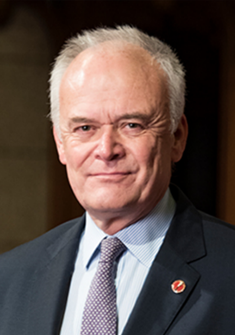
Appointment to the senate
- Appointed to the Senate in 2018 by Prime Minister Justin Trudeau
Professional background
- Holds Ph. D in History from the University of Edinburgh, an MA in International Affairs at Carleton University, and a Bachelor in English and History from Wilfrid Laurier University.
- Former foreign service officer
- Senior Official responsible for the annual North American Leaders’ Summit (2005-2008)
- Ambassador to Germany from 2008 to 2012
- Previously served as Assistant Deputy Minister for the America’s, North America and Consular Affairs
- Previously served as Minister of Political and Public Affairs at the Embassy of Canada to the US in Washington, and a number of other diplomatic roles.
- Deputy Minister for the G7 Summit and Personal Representative of the Prime Minister (2017-2018).
- Served as Sherpa for the G8 and G7 Summits, as well as the Nuclear Security Summit.
- Recipient of the Public Service of Canada Outstanding Achievement Award and the Canadian Foreign Service Officer Award.
Committee membership
- Member of the Standing Senate Committee on National Security and Defence (2018-)
- Chair of the Standing Senate Committee on Foreign Affairs and International Trade (2019-)
- Member since 2018
- Member of the Standing Senate Committee on National Finance (2018-)
- Member of the Standing Senate Committee on Internal Economy, Budgets and Administration (2019-2021), and others.
Political and parliamentary roles
- Deputy Minister of Foreign Affairs, Trade and Development (2016-2018)
Other interests
- Human right issues in China, NATO
Pierre-Hugues Boisvenu, CPC (Quebec- La Salle)
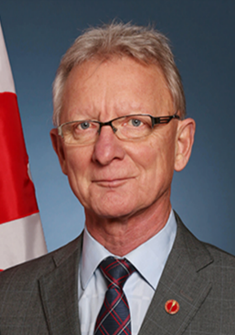
Appointment to the senate
- Appointed to the Senate in 2010 by Stephen Harper.
Professional background
- Holds a bachelor’s degree in psychology, and a Masters in Public Administration
- Worked for over 30 years in Quebec’s public service as a senior official and deputy minister.
- Founded the Murdered or Missing Persons’ Families’ Association, with three other fathers.
- Awarded the Government of Quebec’s Prix de la justice in 2005.
- Co-founder of Le Nid, a shelter for abused women in Val-d’Or.
- Chair of the United Way of the Eastern Townships (2006-2010.
Committee membership
- Member of the Standing Senate Committee on National Security and Defence (2010-)
- Vice-Chair of SECD (2019-2021)
- Vice-Chair of the Standing Senate Committee on Legal and Constitutional Affairs (2021-)
- Member since 2010
- Member of the Standing Senate Committee on Social Affairs, Science and Technology (2011-2019, and 2021-)
- Member of the Standing Senate Committee on Transport and Communications (2010-2021)
- Member of the Special Senate Committee on Senate Modernization (2015-2019)
- Member of the Standing Senate Committee on Banking, Trade and Commerce (2015-2019), and others.
Points of interest to CSE
- Question Period in the Senate, December 2020: Concern over Canada-China joint military exercises due to the Chinese regime’s potential to interfere in Canada’s internal affairs.
Other interests
- Victim legislation and rights in the justice system, women’s rights, improving human trafficking legislation
Donna Dasko, ISG (Ontario)

Appointment to the senate
- Appointed to the Senate in 2018 by Prime Minister Justin Trudeau.
Professional background
- Holds a Ph. D and MA from the University of Toronto
- Was Senior Vice-President of Environics Research Group Ltd
- Previous leader in developing media-sponsored polling, including the Globe-Environics Poll and election and special feature polling for the CBC.
- Was Governor of the Canadian Unity Council (devoted to Canadian unity and federalism), and held multiple other volunteer leadership roles.
- Currently serves on the Board of Directors of Women’s Legal Education and Action Fund (LEAF).
- Currently works with National Democratic Institute on issues related to women in politics internationally.
- Current Senior Fellow at the University of Toronto’s Munk School of Global Affairs and Public Policy.
- Current member of Statistics Canada’s Advisory Committee on Social Conditions.
Committee membership
- Member of the Standing Senate Committee on National Security and Defence (2018-)
- Member of the Standing Senate Committee on Internal Economy, Budgets and Administration (2019-)
- Member of the Standing Senate Committee on Social Affairs, Science and Technology (2018-)
- Member of the Standing Senate Committee on Transport and Communications (2018-)
- Member of the Standing Senate Committee on National Finance (2019-2021)
- Member of the Special Senate Committee on the Arctic (2018-2019), and others.
Other interests
- Women in politics, peace and security in Ukraine.
Marty Deacon, ISG (Ontario – Waterloo Region)
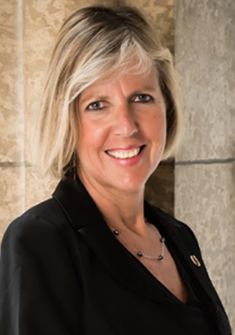
Appointment to the senate
- Appointed to the Senate in 2018 by Prime Minister Justin Trudeau
Professional background
- Holds a Masters of Education from Western University
- 35-year career in education where she taught in Secondary Schools and Universities.
- Was a consultant and an administrator at the elementary and secondary school level, and finished her career in education as Superintendent.
- Afterwards, she consulted across sectors with a focus on organizational excellence.
- Over the past 24 years, she coached, led or served at 15 Olympic, Commonwealth and Pan Am Games.
- Led Team Canada at the 2010 Commonwealth Games in Delhi, India.
- Currently serves as Director on the Canadian Olympic Committee, Commonwealth Games Canada, Ontario Excellence Leadership Centre and the Grand River Jazz Society.
- Recognized for multiple awards, including the Queen Diamond Jubilee Medal.
Committee membership
- Member of the Standing Senate Committee on National Security and Defence (2019-)
- Member of the Standing Senate Committee on Foreign Affairs and International Trade (2019-)
- Member of the Standing Senate Committee on Aboriginal Peoples (2018-2021)
- Member of the Standing Senate Committee on National Finance (2018-2021)
- Member of the Special Senate Committee on Senate Modernization (2018-2019)
- Member of the Special Senate Committee on the Arctic (2018-2019), and others.
Other interests
- Physical and mental health, education and sport.
Mobina S. B. Jaffer, ISG (British Columbia)
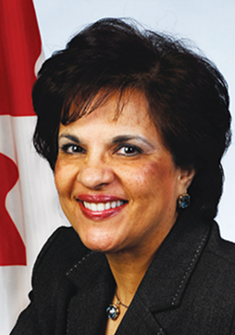
Appointment to the senate
- Appointed to the Senate in 2001 by Prime Minister Jean Chrétien.
Professional background
- Holds a Bachelor of Laws from London University in London, England and completed the Executive Development program at Simon Fraser University in BC.
- Is an accomplished lawyer and has been practicing since 1978.
- Was appointed Queen’s Counsel in 1998.
- Served as Canada’s Special Envoy for Peace in Sudan (2002-2006)
- Chaired the Canadian Committee on Women, Peace, and Security (2002-2005).
- Often invited to speak at international conferences on security issues and the UN Security Council Resolution 1325.
- Chaired a number of studies on the Standing Senate Committee on Human Rights, including one of the sexual exploitation of children in Canada and the need for national action.
Committee membership
- Member of the Standing Senate Committee on National Security and Defence (2001-)
- Vice-Chair (2015-2019)
- Chair of the Standing Senate Committee on Legal and Constitutional Affairs (2019-)
- Member since 2001.
- Chair of the Subcommittee on Veterans Affairs of the Standing Committee on National Security and Defence (2015-2019)
- Member of the Standing Senate Committee on Human Rights (2001-2019)
- Served as Chair and Vice-Chair for a couple parliamentary sessions.
- Member of the Special Senate Committee on Anti-Terrorism (2006-2011), and others.
Political and parliamentary roles
- Critic for the Liberal Party of Canada for Citizenship and Immigration (2012-2014)
- Critic for the Liberal Party of Canada for Justice (Human Rights) (2012-2014)
Points of interest to CSE
- Second reading of Bill C-59, December 2018: Expressed concern over what is considered “publicly available information”, and the harm CSE and CSIS may cause to the privacy of Canadians, specifically diverse Canadians.
Other interests
- Women’s and children’s rights, bilingualism, the abuse of profiling in counterterrorism measures, respecting privacy, human rights, the rule of law.
Yonah Martin, CPC (British Columbia)
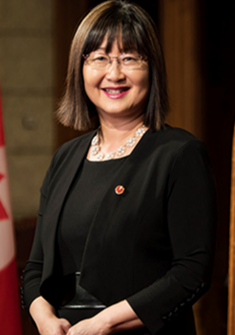
Appointment to the senate
- Appointed to the Senate in 2009 by Prime Minister Stephen Harper.
Professional background
- Has her Bachelor’s and Master’s in Education.
- Had a 21-year teaching career prior to her appointment (1987-2008).
- Co-founded C3 Korean Canadian Society, a non-profit organization that aims to bridge communities.
- Currently serves as Honorary Patron of C3, as well as serving on several regional, national and international Boards and Advisory Councils.
- Awarded the Order of Civil Merit Moran Medal by the President of the Republic of Korea for outstanding leadership and work in advancing the rights of overseas Koreans, among other awards.
- Notable achievements as a Senator include the enactment of her Senate Public Bill – Korean War Veterans Day Act (June 2013); the implementation of the historic Canada Korea FTA (January 2016), amongst others.
Committee membership
- Member of the Standing Senate Committee on National Security and Defence (2019-, and 2008-2011)
- Member of the Standing Senate Committee on Human Rights (2008-)
- Member of the Standing Senate Committee on Internal Economy, Budgets and Administration (2015-, 2008-2011), and others
Political and parliamentary roles
- Deputy Leader of the Opposition in the Senate (2015-)
- Deputy Leader of the Government in the Senate (2013-2015)
- Deputy Whip of the Government (2011-2013)
- Co-Chair of the Canada Korea Inter-Parliamentary Group (2009-), and others.
Points of interest to CSE
- Question Period in the Senate, June 2021: Expressed concern that Canada remains the only Five Eyes partner not to ban or restrict Huawei and that PM Trudeau is overdue on making this decision.
- Raises the issue of 5G and Huawei in a similar manner in numerous other sittings.
- Second reading of Bill C-59, November 2018: Felt as though certain provisions weakened Canada’s national security and wanted clarification around CSE’s mandate (no specifics on which provisions she is referring to).
Other interests
- Canadian-Korean relations, education, women in politics.
Terry M. Mercer, PSG (Nova Scotia – Northend Halifax)
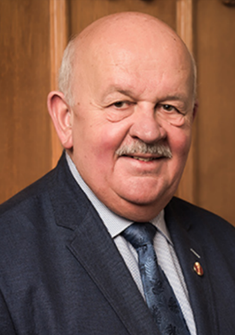
Appointment to the senate
- Appointed to the Senate by the Right Honourable Jean Chrétien in 2003.
Professional background
- Bachelor of Arts from St. Mary’s University
- Ph. D of Civil Law, Honoris Causa (Arts and Science) from St. Mary’s University
- Executive Assistant to the Nova Scotia Minister of Labour and Housing (1974-1978).
- Lectures on ethical fundraising techniques
- Member of the Executive Committee of the North American YMCA Development Offices (1990-1997)
- Served on the AFP Association Board of Directors and the AFP Canada Council.
- Held a wide variety of position with various charitable institutions, such as Executive Director of the Metro Toronto Branch of the Canadian Diabetes Association (1993-1995)
- Director of Fundraising of the Liberal Party of Canada (1995), and as National Director of the Liberal Party of Canada (1997-2003).
Committee membership
- Member of the Standing Senate Committee on National Security and Defence (2004-)
- Member of the Standing Senate Committee on Agriculture and Forestry (2003-)
- Vice-Chair (2011-2019)
- Member of the Senate Committee of Selection (2011-)
- Chair (2019-2021)
- Member of the Standing Senate Joint Committee on the Library of Parliament (2008-)
- Member of the Standing Senate Committee on Legal and Constitutional Affairs (2003-2019)
Political and parliamentary roles
- Acting Deputy Leader of the Progressive Senate Group (2019-2021)
- Deputy Leader of the Senate Liberals (2016-2019)
- Chair of the Senate Liberal Caucus (2016-2019)
- Critic for Transport, for the Liberal Party of Canada (2012-2014)
- National Director of the Liberal Party of Canada (1997-2004)
Other interests
- Health care, youth involvement in politics, equality rights, agricultural policy
David Richards, CSG (New Brunswick)
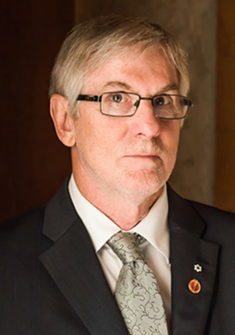
Appointment to the senate
- Appointed to the Senate in 2017 by Prime Minister Trudeau.
Professional background
- Acclaimed Canadian novelist, essayist, screenwriter and poet.
- Has been a writer-in-residence in several universities and colleges across Canada.
- Has received honorary doctorates from three New Brunswick universities and the Atlantic School of Theology.
- One of only three writers to have won in both the fiction and non-fiction categories of the Governor General’s Literacy Award.
- Awarded the Canadian Authors Association Award and the 2011 Matt Cohen Award for a distinguished lifetime of contribution to Canadian literature. Has been awarded numerous other awards for writing.
Committee membership
- Member of the Standing Senate Committee on National Security and Defence (2017-)
- Member of the Standing Senate Committee on Foreign Affairs and International Trade (2021-)
- Member of the Standing Senate Committee on National Finance (2019-)
- Vice-Chair (2019-2021)
- Member of the Standing Senate Committee on Legal and Constitutional Affairs (2019-2021)
- Member of the Standing Senate Committee on Fisheries and Oceans (2019-2021)
Points of interest to CSE
- Question Period in the Senate, March 2020: Concern over Canadian sovereignty due to six countries in the Arctic vying for mining exploration rights, including Russia and China.
Other interests
- Improving firearm legislation, such as heightened background checks (proposing amendments to Bill C-71), Arctic sovereignty.
Hassan Yussuff, ISG (Ontario)
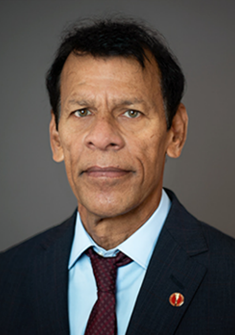
Appointment to the senate
- Appointed to the Senate by Prime Minister Trudeau in 2021.
Professional background
- Worked as a truck mechanic with General Motors for 10 years.
- In 1988, he joined the Canadian Auto Workers union as the National Staff Representative, and later became their first Director of Human Rights.
- In 1999, he became Canadian Labour Congress’s first person of colour elected to an executive position, as Executive Vice-President.
- Elected as Secretary-Treasurer at Canada Labour for three terms (2002-2014)
- Elected President of Canada Labour in 2014. Re-elected in this role in 2017.
- Elected President of the Trade Union Confederation of the Americas (2016).
- Was a member of the Ministerial Council of the trade Union Advisory Committee to the Organization for Economic Co-operation and Development.
- Served on the Government of Canada’s NAFTA Council and its Sustainable Development Advisory Council.
- Served as Co-Chair of the Task Force on Just Transition for Canadian Coal Power Workers and Communities.
- Recently appointed to the Net-Zero Advisory Body by the Minister of the Environment and Climate Change.
- Also, recently a part of the Industry Advisory Roundtable on COVID-19 Testing, Screening, Tracing and Data Management and the COVID Communications Partners Roundtable.
- Has received honorary Doctorate of Laws from Brock University and Ryerson University.
Committee membership
- Member of the Standing Senate Committee on National Security and Defence (2021-)
- Member of the Standing Senate Committee on National Finance (2021-)
- Member of the Standing Senate Committee on Banking, Trade and Commerce (2021-)
Other interests
- Fair labour codes in Canada (supports Bill C-3).
Committee backgrounder
Backgrounder on the Standing Senate Committee on National Security and Defence (SECD)
44th Parliament, 1st Session
Mandate
SECD has the mandate to examine legislation and study issues related to national defence, security and veterans affairs.
Recent appearances
- Chief, CSE appeared before the committee in April 2019 for the committee’s study on Bill C-59.
Key studies
Studies SECD will focus on this Parliamentary Session:
- National security and defence generally
- Security and defence in the Arctic
- Issue relating to Veterans Affairs
Studies in recent years:
- Second Report on Bill C-228; an Act to establish a federal framework to reduce recidivism, without amendment but with observations
- Sexual Harassment and Violence in the Canadian Armed Forces
- UN Deployment: Prioritizing Commitments at Home and Abroad
- Reinvesting in the Canadian Armed Forces: A Plan for the Future
Previous meetings (current session)
March 28, 2022: Examine and report on issues relating to security and defence in the Arctic. Those who appeared include:
- Dr. Wilfrid Greaves, Assistant Professor of International Relations, University of Victoria, As an Individual
- Dr. Lassi Heininen, Professor, University of Lapland, Finland, Leader of Thematic Network on Geopolitics and Security and Chair of the Arctic Circle Mission Council on the GlobalArctic, As an Individual
- Dr. Rob Huebert, Associate Professor, Department of Political Science, University of Calgary, As an Individual
- Dr. Whitney Lackenbauer, Canada Research Chair in the Study of the Canadian North and Professor, Trent University, As an Individual
- Dr. Suzanne Lalonde, Professor, Faculty of Law, Université de Montréal, As an Individual
- Dr. Andreas Østhagen, Senior researcher, Fridtjof Nansen Institute & High North Center at Nord University and Global Fellow at Wilson Center, As an Individual
- Dr. Elizabeth Riddell-Dixon, Professor, University of Western Ontario, and Senior Fellow at the Bill Graham Centre for Contemporary International History, University of Toronto, As an Individual
March 21. 2022: Examine and report on issues relating to security and defence in the Arctic. Those who appeared include:
- Brigadier-General Pascal Godbout, Commander, Joint Task Force North, Department of National Defence and the Canadian Armed Forces
- Kevin Hamilton, Director General, International Security Policy, Global Affairs Canada
- Heidi Lorraine Kutz, Senior Arctic Official and Director General for Arctic, Eurasian, and European Affairs, Global Affairs Canada
- Jonathan Quinn, Director, General Continental Policy, Department of National Defence and the Canadian Armed Forces
- Stephen Randall, Director, Oceans, Environmental and Aerospace Law Division, Global Affairs Canada
- Wayne Walsh, Director General, Northern Strategic Policy Branch, Northern Affairs Organization, Crown-Indigenous Relations and Northern Affairs Canada
- Major-General M.C. Wright, Commander, Canadian Forces Intelligence Command and Chief of Defence Intelligence, Department of National Defence and the Canadian Armed Forces
February 7, 2022: Consideration of a draft agenda (future business)
December 13, 2021: Organization meeting
Potential questions and answers
Foreign interference
Are Chinese or Russian state-sponsored actors attempting to disrupt Canadian critical infrastructure?
- CSE has assessed that state-sponsored programs of China, Russia, Iran and North Korea all pose threats to Canada.
- CSE has also assessed that it’s very likely that state-sponsored actors are attempting to develop capabilities that could disrupt critical infrastructure, such as the supply of electricity.
- These actors may also continue to target our critical infrastructure to collect information, position for future activity or attempt to intimidate Canadians.
- But CSE assesses it is unlikely that actors will use cyber activities to disrupt or harm critical infrastructure outside conflict scenarios.
- Adopting cybersecurity best practices goes a long way to offsetting risks of exploitation by any cyber threat actor.
Has there been any observable change of cyber intrusions or attempts of intrusions due to the COVID-19 pandemic from foreign state-sponsored actors?
- CSE continues to advise the government on cyber threats and incidents.
- The bulk of malicious threat activity that CSE has observed during the COVID-19 pandemic continues to be criminal in nature, and CSE is working with the appropriate partners to address such activity. For example, CSE has issued alerts and cyber security advice about COVID-related phishing campaigns.
- CSE assess that foreign intelligence agencies will almost certainly continue to use their cyber capabilities to pursue intelligence related to COVID-19 medical research and intellectual property. Intellectual property, especially related to vaccine development, treatments, COVID-19 testing, and medical devices such as ventilators or personal protective equipment (PPE), would offer public health, economic, and national security benefits.
- Adopting cybersecurity best practices goes a long way to offsetting risks of exploitation by any cyber threat actor.
Has there been an increase in commercial espionage against Canadian organizations from state-sponsored actors?
- State-sponsored actors will certainly continue to conduct espionage against Canadian businesses, academic or governments to steal intellectual property or proprietary information.
- State-sponsored cyber threat actors will continue to target intellectual property related to combatting COVID-19 in order to support their own domestic health responses or to profit from its illegal reproduction by their own firms.
- Adopting cybersecurity best practices goes a long way to offsetting risks of exploitation by any cyber threat actor.
Cyber security
What support has CSE provided in response to recent cyberattacks?
- The Communications Security Establishment (CSE) continues to monitor the cyber threat environment, including cyber threat activity directed at critical infrastructure networks.
- CSE’s Cyber Centre has alerted Canadian critical infrastructure operators to be aware of the risks, and has provided them with expert advice to mitigate against cyber threat activity.
- There are systems and tools in place to monitor, detect, and investigate potential threats, and to take active measures to address and neutralize them when they occur.
- If Canadian companies have been impacted by cyber threats, they are urged to contact CSE’s Cyber Centre.
- As this investigation is ongoing, I cannot comment further on the incident.
The Newfoundland and Labrador government is planning an update on impacts of the cyber-attack that targeted its health care system a few months ago. What have you done to help ensure such an attack will not happen on federal systems in the future? Have you made any efforts with this province to share information and prevent future problems?
- We are unable to comment specifically on the cyber incident that impacted Newfoundland and Labrador’s health care system in 2021, but we can confirm the Canadian Centre for Cyber Security (the Cyber Centre) has remained in contact with the Province since the very beginning of the incident.
- The Cyber Centre has provided incident support and mitigation services, including tailored advice and guidance to support them throughout their recovery efforts.
- Any further updates on the cyber incident should be addressed to provincial authorities.
Huawei and 5G
Our Five Eyes partners have made decisions on Huawei and their 5G networks. When will Canada make a decision on Huawei?
- While we cannot comment on specific companies, the Government has been conducting an examination of emerging 5G technology and the associated security and economic considerations.
- As the Prime Minister noted, there will be a decision on the 5G security review “in due course”.
- We continue to work with partners and other agencies to mitigate risks stemming from designated equipment and services, including Huawei, being used in Canadian 3G, 4G, and LTE telecommunication networks.
Does CSE have any concerns about the social media app Tik Tok or WeChat?
- CSE's Cyber Centre is not a regulatory agency and as such does not endorse or ban social media applications.
- It is important for Canadians to adopt good cyber security practices – which CSE shares on the cyber.gc.ca website.
CSE activities and COVID-19
What is the Government doing to counter misinformation surrounding the COVID-19 pandemic?
- Cyber threat actors are using fake websites, imitating health agencies or government departments, to spread disinformation or to defraud Canadians.
- In response, CSE is helping to identify and take down these kinds of malicious websites.
- In coordinately with industry partners, CSE has contributed to the removal of more than 10,000 fraudulent sites or email addresses, including those pretending to be the Public Health Agency and the Canada Revenue Agency.
- CSE also continues to provide critical foreign intelligence to inform decisions on Canada’s approach to COVID-19.
Has CSE dealt with any compromises of our own research organizations?
- CSE is aware of incidents of malicious threat activities directed at Canadian health research organizations and continues to offer cyber security support and sharing of threat related information to limit any potential impacts to targeted organizations.
- CSE recommends that all Canadian health and research organizations remain vigilant and apply best practices in cyber security. Such practices include monitoring network logs, remaining alert to suspicious emails and calls, and keeping servers and critical systems patched for all known security vulnerabilities.
- While CSE cannot speak on any specific incidents, CSE is working with Canadian health care and research sectors, and other partners and industries, as appropriate.
What has CSE done specifically to reduce the risks that Canadian research and development efforts could be compromised, specific points about what we are doing with Canadian universities, GC science departments, and the private sector?
- CSE, in collaboration with CSIS, continues to engage with all of these entities to provide threat briefings. CSE, through the Cyber Centre, has published practical steps organizations can proactively take to protect themselves. These are all available online. This is in addition to alerts and advisories published regularly to draw attention to security vulnerabilities or issues.
- Further, when CSE sees malign foreign cyber activities it have both alerted the victims and assisted with recovery but also, with its colleagues around government and its allies, publicly attributed this activity as seen this past year.
- More recently we have been working with ISED to assess the cyber security posture for recipients of strategic innovation funds but it is important to note that all of the advice and guidance is publicly available for all Canadian organizations.
The National Cyber Threat Assessment Report
What is the National Cyber Threat Assessment report? What information does it include?
- The Cyber Centre produces a report every two years outlining the greatest threats Canada faces.
- On November 18, the Cyber Centre released the National Cyber Threat Assessment Report 2020, an update to its previous 2018 report.
- The NCTA 2020 provides an update to the 2018 National Cyber Threat Assessment with an analysis of the interim years and forecasts looking ahead to 2022.
- The key judgements in this report are based on reporting from multiple sources, including classified and unclassified information. The judgements are based on the Cyber Centre’s knowledge and expertise in cyber security and informed by CSE’s foreign intelligence mandate, which provides us with valuable insights on cyber threat activity around the world.
What are the primary concerns and observations made in the report?
- The National Cyber Threat Assessment 2020 highlights 4 key observations:
- First, cyber-crime is the most likely threat to impact Canadians now and in the years ahead;
- Second, cybercriminals often succeed in their work because they exploit human and social behaviours;
- Third, ransomware directed against Canada will almost certainly continue to target large enterprises and critical infrastructure providers.
- Finally, while cybercrime is the main threat, state-sponsored cyber programs of China, Russia, North Korea and Iran pose a strategic threat to Canada.
Media lines
CSE key messages
- As Canada’s national cyber security and foreign signals intelligence agency, CSE has unique technical and operational capabilities.
- The Communications Security Establishment Act (the CSE Act) sets out five aspects of our mandate: cyber security and information assurance; foreign intelligence; defensive cyber operations; active cyber operations; and technical and operation assistance. We use our technical expertise in all five aspects of our mandate. We do so to keep Canadians safe and secure.
- CSE’s foreign signals intelligence program provides Canada’s senior decision-makers with insights into the activities, motivations, capabilities, and intentions of foreign adversaries, and the international readiness and foreign reactions to a variety of diverse global events.
- CSE’s intelligence reporting also identifies hostile state activities, and the CSE Act authorizes us to assist the Department of National Defence and the Canadian Armed Forces.
- We support Canadian military operations and protect forces deployed abroad through advanced cyber techniques. For example, CSE could protect Canadian forces by disrupting an adversary’s ability to communicate or providing intelligence regarding an imminent threat.
- The CSE Act gives CSE the legal authority to conduct cyber operations to disrupt foreign-based threats to Canada. This includes active cyber operations to degrade, disrupt, respond to, or interfere with the capabilities, intentions or activities of foreign individuals, states, and organizations.
- If there are reasonable grounds to believe that a foreign state or actor constitutes a threat to the security of Canada and/or Canadian military forces, we are prepared to take appropriate action to address the threat.
- We continue to provide the Government of Canada with the most comprehensive information available related to Canada’s intelligence priorities, directly furthering Canadian safety, security, and prosperity.
CSE’s support to the Canadian Armed Forces and Operation UNIFIER
- As Canada’s national cyber security and foreign intelligence agency, CSE has unique technical and operational capabilities. The CSE Act includes authorities that allow us to provide technical and operational assistance to the Department of National Defence and the Canadian Armed Forces (CAF).
- CSE is authorized to assist the CAF in support of government-authorized military missions, such as Operation UNIFIER. This support includes intelligence sharing and cyber security.
- While we can’t speak about specific operations, CSE can be counted to deliver on its mission working with Canada’s military presence in support of Ukraine.
- This increased support will help Ukraine strengthen its security and ability to defend itself against a range of threats.
CSE’s messaging on cyber security in response to Ukraine and geopolitical events
- Cyber security is one of the most serious economic and national security challenges countries face.
- Canada engages internationally to promote and protect a free, open, and secure cyberspace.
- The Government of Canada deals with ongoing and persistent cyber risks and threats every day.
- Cyber threats can result from system or application vulnerabilities, or from deliberate, persistent, targeted attacks by outside actors to gain access to information.
- CSE and its Canadian Centre for Cyber Security (Cyber Centre) remain committed to working with domestic and international security and intelligence partners to maintain the open, reliable, and secure use of cyberspace.
- On Wednesday, January 19, 2022, CSE’s Cyber Centre published a cyber threat bulletin urging Canadian critical infrastructure operators to raise awareness and take mitigations against Russian-backed cyber threat activity.
- CSE’s most recent cyber security bulletin is a proactive advisory for Canadian critical infrastructure operators urging them to adopt a heightened state of awareness and to conduct proactive network monitoring and mitigations.
- It is further intended to raise awareness and draw further attention to known Russian-backed cyber threat activity, including the tactics, techniques and procedures used to target operational and information technology.
- CSE’s Cyber Centre issued a reminder to Canadians on February 15, 2022.
- The Cyber Centre also published an Alert on January 17, 2022, outlining ‘Wiper malware’ being used to target Ukrainian organizations.
If pressed on release date of threat bulletin and GAC cyber incident:
- Cyber threats are persistent. CSE issues security threat bulletins and cyber alerts on a regular basis. CSE's cyber security bulletin released on January 19th followed similar bulletins released by US and UK partners to understand and mitigate cyber threats to critical infrastructure.
Cyber incident involving the National Research Council of Canada:
- CSE and its Canadian Centre for Cyber Security (Cyber Centre) can confirm we are working with the National Research Council (NRC) in response to a recent cyber incident.
- We have been engaged with NRC and government cyber security partners since Friday, March 18, 2022.
- The Government of Canada, like every other government and private sector organization in the world, is subject to ongoing and persistent cyber threats. Cyber threats can result from system or application vulnerabilities, or from deliberate, persistent, and targeted attacks by outside actors to gain access to information. We are constantly reviewing measures to protect Canadians and our critical infrastructure from electronic threats, hacking, and cyber espionage.
- At this point, we are unable to comment further on any specific details regarding this incident. We can assure you that we continue to work closely with our cyber defence colleagues at the Treasury Board Secretariat – Office of the Chief Information Officer, and Shared Services Canada to ensure there are systems and tools in place to monitor, detect, and investigate potential threats, and to neutralize threats when they occur.
Cyber threats to Canadian critical infrastructure
- The Government of Canada, through CSE’s Canadian Centre for Cyber Security (Cyber Centre), has been in contact with critical infrastructure operators to ensure they are aware of cyber threats related to geopolitical tensions. CSE continues to monitor Russia-backed cyber actors and share threat-related information with Canadians and Canadian organizations in a timely basis.
- Notwithstanding current geopolitical events, the Cyber Centre shares valuable cyber threat information with Canada’s critical infrastructure partners via protected channels on a regular basis.
- This information includes indicators of compromise, threat mitigation advice, and confidential alerts regarding new forms of malware, and other tactics, techniques, and procedures being used to target victims.
- While the Cyber Centre is not aware of any current specific threats to Canadian organizations in relation to events in and around Ukraine, there has been an historical pattern of cyber attacks on Ukraine having international consequences, such as the malware known as NotPetya in 2017. This is why we have issued unclassified threat bulletins reminding Canadian critical infrastructure operators and defenders to be aware of the risks and take mitigations against known Russian-backed cyber threat activity. Now is the time to take defensive action and be proactive in network monitoring and applying appropriate mitigations.
- Canada has a strong and valuable relationship with its Five Eyes alliance partners, including our intelligence, cyber defence, and law enforcement counterparts in the United States. We regularly share information with our partners that has a significant impact on protecting our respective countries’ safety and security. While we can’t confirm or deny, or offer specific details on the intelligence shared, threat information to help defend against critical infrastructure threats is regularly shared and acted upon as appropriate.
- CSE’s Cyber Centre recently joined Five Eyes partners in issuing a Cybersecurity Advisory on Russian state-sponsored and cybercriminal threats to critical infrastructure. We assess there is an increased risk to critical infrastructure organizations globally from Russian state-sponsored advanced persistent threat (APT) actors, their proxies, and independent cybercriminal groups. These actors and criminal groups may conduct cyber operations, such as deploying ransomware or distributed denial of service (DDoS) attacks, against U.S., Australian, Canadian, New Zealand, or UK organizations to disrupt or harm critical industrial control system (ICS)/operational technology (OT) functions.
Cyber incident involving Global Affairs Canada:
- On January 24th, the Treasury Board Secretariat – Office of the Chief Information Officer (TBS-CIO), and Shared Services Canada (SSC), confirmed they are working with Government of Canada partners, including the Communications Security Establishment (CSE) and its Canadian Centre for Cyber Security, in response to a recent cyber incident involving Global Affairs Canada (GAC).
- The cyber incident was detected on January 19, after which mitigation actions were taken.
- Most systems are back to normal operations. Critical services for Canadians, such as the provision of consular support, were not affected.
- Global Affairs Canada worked with partner government departments, including CSE and its Canadian Centre for Cyber Security to restore full service.
- Global Affairs Canada has robust Cyber Security monitoring in place and takes cyber security and this incident very seriously. We cannot comment on the specifics of safety and security measures.
- At this time, there is no indication that any other government departments have been impacted by this incident.
- There are systems and tools in place to monitor, detect, and investigate potential threats, and to take active measures to address and neutralize them when they occur.
- We are unable to comment further on any specific details for operational reasons.
- Our cyber defence and incident response teams work 24/7 to identify compromises and alert potential victims within the federal government and Canadian critical infrastructure. In the wake of a cyber incident, the incident response team offers advice and support to contain the threat and mitigate any potential harm.
- We are constantly reviewing measures to protect Canadians and our critical infrastructure from electronic threats, hacking, and cyber espionage. We encourage all government and non-government partners to use cyber security best practices.
Statement - Update on GAC cyber incident
- The Treasury Board Secretariat – Office of the Chief Information Officer (TBS-CIO), and Shared Services Canada (SSC), can confirm they continue to work with Government of Canada partners, including the Communications Security Establishment (CSE) and its Canadian Centre for Cyber Security, in response to a recent cyber incident involving Global Affairs Canada (GAC).
- Critical services for Canadians through Global Affairs Canada remained functional through mitigation efforts, and since our last statement nearly all GAC priority services have been restored. It is important to note that any GAC internet-based services that were impacted during the past week were a result of the mitigation efforts taken to resolve the incident, and were preventative in nature.
- Equally important to note, there continues to be no indication that any other government departments have been impacted by this incident.
- The Government of Canada deals with ongoing and persistent cyber risks and threats every day.
- Cyber threats can result from system or application vulnerabilities, or from deliberate, persistent, targeted attacks by outside actors to gain access to information.
- We urge Canadians and Canadian organizations to remain vigilant and to visit Cyber.gc.caK and getcybersafe.gc.ca for tips on how to stay secure online.
CSIS comments that Canada is subject to thousands of cyber attacks every day
- The Government of Canada (GC) faces a variety of sophisticated and unsophisticated cyber threats on a daily basis. Cyber threat actors probe government systems and networks millions of times daily, looking for vulnerabilities, and these activities are becoming more frequent and more sophisticated.
- CSE works every day to defend government systems from these attempts. The hundreds of millions of malicious activities include, for example, reconnaissance scans, direct attempts to install malicious software on government networks, and attempts to access GC databases.
- On any given day, CSE’s defensive systems can block anywhere from 2 to 7 billion events targeting GC networks. These defensive actions are a result of CSE’s existing dynamic cyber defence capabilities which remain ready to defend Government of Canada systems and help protect against future attacks.
- CSE and its Canadian Centre for Cyber Security (Cyber Centre) work diligently with Shared Services Canada and our other partners to ensure Government of Canada networks and infrastructure are well defended against cyber threats.
- Even though we know that Canadian cyber incidents are underreported to law enforcement and the Cyber Centre, we receive approximately 100 reports per month from Canadians and Canadian organizations.
- The Cyber Centre has knowledge of 235 ransomware incidents against Canadian victims from 1 January to 16 November 2021. More than half of these victims were critical infrastructure providers. It is important to note, however, that most ransomware events remain unreported.
CSE issue notes
MND mandate letter
- A safe and secure cyber space is critical for the security, stability and prosperity of Canada.
- We know that the global cyber security threat landscape is rapidly evolving. Cyber incidents, including significant critical infrastructure incidents, are increasing in number and sophistication.
- While the Government of Canada is equipped with the appropriate tools to respond to the challenge, there is a gap when it comes to this demand for the cyber security services of the Communications Security Establishment (CSE) versus the resources we have available to respond to these challenges.
- That is why in the Minister of National Defence’s (MND) mandate letter to the Prime Minister specifically included the priorities of ensuring that we are in a position to lead the national response to rapidly evolving cyber risks and threats, including through adequate resources.
- The MND was also tasked with working with the Minister of Public Safety, the Minister of Foreign Affairs, and the Minister of Innovation, Science and Industry, and other implicated ministers on the renewal of the National Cyber Security Strategy.
- The renewed strategy will outline Canada's long-term plan to protect our national security and economy, deter cyber threat actors, and promote norms-based international behavior in cyberspace.
- As outlined in MND’s mandate letter MND will also work to continue to advance the National Cyber Security Action Plan.
- This will help ensure that Canada is well positioned to address urgent and pressing cyber risks, and to ensure the security and integrity of Canada’s critical systems.
Details
Specific cyber mentions in MND’s mandate letter
- Oversee the Communications Security Establishment to ensure that they are in a position to lead Canada’s response to rapidly evolving cyber risks and threats, including through adequate resources and close cooperation with our allies.
- Work with the Minister of Public Safety, the Minister of Foreign Affairs, and the Minister of Innovation, Science and Industry, and in collaboration with implicated ministers, to develop and implement a renewed National Cyber Security Strategy, which will articulate Canada's long-term strategy to protect our national security and economy, deter cyber threat actors, and promote norms-based international behavior in cyberspace.
- Working with the Minister of Public Safety, Minister of Justice and Attorney General of Canada and Minister of Innovation, Science and Industry, and with the support of the Minister of Foreign Affairs, continue to advance the National Cyber Security Action Plan, ensuring Canada is well positioned to adapt to and combat cyber risks, and ensure the security and integrity of Canada’s critical systems.
Russian invasion of Ukraine and Russian cyber threats to Canada
- In light of Russia’s ongoing, unjustified military actions in Ukraine, CSE and its Canadian Centre for Cyber Security (the Cyber Centre) strongly encourage all Canadian organizations to take immediate action and bolster their online cyber defences.
- While CSE can’t speak to specific operations, I can confirm that we have been tracking cyber threat activity associated with the current invasion.
- We have the tools in place to monitor, detect, and investigate potential threats, and to take active measures to address them.
- CSE’s valuable cyber threat intelligence has been shared with key partners in Ukraine. We also continue to work with Canadian Armed Forces (CAF) in support of UNIFIER.
- The Cyber Centre is not aware of any current specific threats to Canadian organizations in relation to events in and around Ukraine, there has been a historical pattern of cyber attacks on Ukraine having international consequences.
Cyber threat bulletin: Russian-backed cyber threat activity
- On January 26, 2022, the Canadian Centre for Cyber Security (the Cyber Centre) released a cyber threat bulletin which urges Canadian critical infrastructure operators to raise awareness and take mitigations against known Russian-backed cyber threat activity.
- The Cyber Centre joined the US and UK partners in recommending proactive network monitoring and mitigations.
- The threat bulletin stated that “CSE is aware of foreign cyber threat activities, including by Russian-backed actors, to target Canadian critical infrastructure network operators, their operational and information technology (OT/IT)”.
- The advisory issued by CSE’s US partners usefully highlights vulnerabilities known to have been exploited by Russian cyber threat actors, as well as information about their tactics, techniques and procedures (TTPs).
Operation UNIFIER
- The Government of Canada condemns Russia’s invasion, and the ongoing attacks in and around Ukraine and is steadfast in its support of Ukraine’s sovereignty, territorial integrity, and independence.
- To this end, on January 26th, 2022, the Government of Canada announced $340 million for immediate support to Ukraine and for the extension and expansion of Operation UNIFIER, Canada’s military training and capacity-building mission in Ukraine.
- As part of this commitment, DND and CAF will work with CSE on measures to support enhanced intelligence cooperation and cyber security.
- This increased support will help Ukraine strengthen its security and ability to defend itself against a range of threats.
- As Canada’s national cyber security and foreign intelligence agency, CSE has unique technical and operational capabilities.
- The CSE Act includes authorities that allow CSE to provide technical and operational assistance to DND and CAF in support of government-authorized military missions, such as Operation UNIFIER.
- While I can’t speak about specific operations, I can confirm that CSE has been sharing valuable cyber threat intelligence with our partners in Ukraine.
Arctic defence and sovereignty
- We continue to provide the Government of Canada with the most comprehensive information available related to Canada’s intelligence priorities, directly furthering Canadian safety, security, and prosperity.
- Canada’s intelligence community, including CSE, assists the Government of Canada in managing the increasingly complex Arctic and Northern policy environment by supporting the implementation of Canada’s Arctic and Northern Policy Framework (ANPF).
- In partnership with other security departments, National Defence penned a Safety, Security, and Defence chapter that highlights the challenges presented by modern threats to Canada’s Arctic and reinforces commitments made in Strong, Secure, Engaged (SSE).
- The framework confirms the Government’s intent to ensure the Canadian Arctic is safe, secure, and well defenced, including by strengthening collaboration with international security partners, improving our all-domain awareness, surveillance and control, and enhancing our military presence as well as emergency and police services.
- CSE, as Canada’s national cybersecurity and foreign intelligence agency, supports the Department of National Defence through the provision of intelligence on priority items.
Cyber security and cyber incidents
- We continue to monitor the cyber threat environment, including cyber threat activity directed at critical infrastructure networks.
- We have alerted Canadian critical infrastructure operators to be aware of the risks and has provided them with expert advice to mitigate against known Russian-backed cyber threat activity.
- Now is the time for Canadian companies to take defensive action and be proactive in network monitoring and applying appropriate mitigations.
- If Canadian companies have been impacted by cyber threats, they are urged to contact CSE’s Cyber Centre.
Foreign interference and cyber threats to democratic process
- The Government of Canada takes seriously its responsibility to protect Canadians from foreign interference, regardless of the source.
- In the lead up to and during the 2021 Federal Election, the Communications Security Establishment (CSE), the Canadian Security Intelligence Service (CSIS), Global Affairs Canada (GAC), and the Royal Canadian Mounted Police (RCMP) worked together closely as part of the Security and Intelligence Threats to Elections Task Force (SITE).
- CSE’s Cyber Centre also worked with Elections Canada to help secure election systems and infrastructure.
- Our security and intelligence agencies coordinated integrated government efforts by raising awareness, monitoring, and reporting on threats, and providing advice to protect our democracy.
- Now that the election has concluded, SITE Task Force partners will continue to work within their respective mandates to detect and counter possible foreign threats to Canada and its democratic institutions.
- While Canada’s democratic institutions and processes are strong and resilient, CSE will continue to actively work to ensure their continued protection.
Huawei and 5G technology
- We take the security of our country’s critical infrastructure very seriously. While we cannot comment on specific companies, the Government has been conducting an examination of emerging 5G technology and the associated security and economic considerations.
- We continue to work with partners and other agencies to mitigate risks stemming from designated equipment and services, including Huawei, being used in Canadian 3G, 4G, and LTE telecommunications networks.
Ransomware
- Ransomware has become an increasingly common and significant risk to government, businesses, and individuals.
- The impact of ransomware can be extensive, and often includes core business disruptions, data loss and potentially significant recovery costs.
- Ransomware remains a profitable activity for cybercriminals and therefore continues to pose a threat to Canada’s national security and economic prosperity.
- I also know that the average ransom payment and frequency in which ransom attacks occur is increasing.
- Paying a ransom not only funds criminal enterprises, it also enables further malicious cyber activity and ultimately there is no guarantee that cybercriminals will return stolen information.
- The Government of Canada is working to reduce the threat of ransomware by targeting and disrupting cybercriminals, coordinating strategies with international allies and by issuing advice, guidance, and services for those affected by ransomware.
- The Communications Security Establishment Act gives CSE the legal authority to conduct cyber operations to disrupt foreign-based threats to Canada, including cybercriminals.
The National Security and Intelligence Committee of Parliamentarians (NSICoP) report
- The Government faces a variety of sophisticated and unsophisticated cyber threats on a daily basis.
- Cyber threat actors probe government systems and networks every day, all day, looking for vulnerabilities, and these activities are becoming more frequent and more sophisticated.
- CSE and our Canadian Centre for Cyber Security (Cyber Centre) work closely with Shared Services Canada (SSC) and other partners to ensure government networks and infrastructure are well defended against cyber threats.
- Canadians can have confidence in our work and Canada’s security and intelligence community.
NSICoP report findings
- We agree with the findings and recommendations of the NSICoP report and expect to extend advanced cyber defence services to all federal organizations to the greatest extent possible.
Details
Special report on the government of canada’s framework and activities to defend its systems and networks from cyber attack
- The Special Report on the Government of Canada’s Framework and Activities to Defend its Systems and Networks from Cyber Attack was tabled in Parliament on February 14th, 2022.
- The Special Report includes four findings and two recommendations to strengthen the government’s framework for defending government networks from cyber attacks and to extend that framework over federal government organizations as broadly as possible.
- The Honourable David McGuinty, Chair of NSICoP, stated that “The report is the first of its kind in Canada. It aims to help the government strengthen its cyber defence framework and ensure that the government is well-protected against cyber threats in the future”.
- The Special Report also commends the Government for:
- Providing strategic direction: National Security Policy (2004); Cyber Security Strategy (2010); National Cyber Security Strategy (2018)
- Making changes to the machinery of government as it relates to cyber security with the creation of Shared Services Canada (2011) and the Canadian Centre for Cyber Security (2018).
- Investing more than $6 billion in defending government networks from cyber attack between 2010 and 2021.
CSE specific mentions in recommendation 2 of special report
- Recommendation two in this NSICOP report states: To the greatest extent possible, the government will extend advanced cyber defence services, notably Enterprise Internet Service of SSC and the cyber defence sensors of the CSE, to all federal organizations.
- CSE is working with the Treasury Board of Canada Secretariat (TBS) and SSC to extend its cyber defence sensors to all federal organizations.
- As Canada’s technical authority on cyber security, and the GC’s Computer Incident Response Team (CIRT), CSE and its Cyber Centre work closely with government partners that do not fall under SSC’s purview.
- CSE regularly shares cyber security advice and guidance, mitigation, and operational updates with these government partners.
DND issue notes
Cyber capabilities
- Everyday, the Communications Security Establishment (CSE) uses its sophisticated cyber and technical expertise to help identify, prepare for, and defend against threats to Canada’s information systems and networks.
- In light of Russia’s ongoing, unjustified military actions in Ukraine, CSE and its Canadian Centre for Cyber Security (Cyber Centre) strongly encourage all Canadian organizations to take immediate action and bolster their online cyber defences.
- The Government of Canada is working to reduce the threat of ransomware by targeting and disrupting cybercriminals, coordinating strategies with international allies and by issuing advice, guidance, and services for those affected by ransomware.
- Combatting ransomware is not just a government effort. Many cyber incidents are preventable. CSE encourages all businesses to immediately review their risk management and business continuity plans with the ransomware threat in mind.
- CSE has tools in place to monitor, detect, and investigate potential threats, and to take active measures to address them. If Canadian companies have been impacted by cyber threats, they are urged to contact CSE’s Cyber Centre.
CSE highlights of Minister of National Defence’s mandate letter
- A safe and secure cyber space is critical for the security, stability and prosperity of Canada.
- The global cyber security threat landscape is rapidly evolving. Cyber incidents, including significant critical infrastructure incidents, are increasing in number and sophistication.
- While the Government of Canada is equipped with the appropriate tools to respond to the challenge, there is a gap when it comes to this demand for the cyber security services of the Communications Security Establishment (CSE) versus the resources we have available to respond to these challenges.
- That is why in my mandate letter, the Prime Minister specifically included the priorities of ensuring that CSE is in a position to lead the national response to rapidly evolving cyber risks and threats, including through adequate resources.
- I was also tasked with working with my colleagues, the Minister of Public Safety, the Minister of Foreign Affairs, and the Minister of Innovation, Science and Industry, and other implicated ministers on the renewal of the National Cyber Security Strategy.
- The renewed strategy will outline Canada's long-term plan to protect our national security and economy, deter cyber threat actors, and promote norms-based international behavior in cyberspace.
- As outlined in my mandate letter MND will also work to continue to advance the National Cyber Security Action Plan.
- This will help ensure that Canada is well positioned to address urgent and pressing cyber risks, and to ensure the security and integrity of Canada’s critical systems.
Foreign interference and the democratic process
- In the lead up to and during the 2021 Federal Election, the Communications Security Establishment (CSE) worked closely with partners at the Canadian Security Intelligence Service (CSIS), Global Affairs Canada (GAC), and the Royal Canadian Mounted Police (RCMP) as part of the Security and Intelligence Threats to Elections Task Force (SITE).
- CSE’s Cyber Centre also worked with Elections Canada to help secure election systems and infrastructure.
- Our security and intelligence agencies coordinated integrated government efforts by raising awareness, monitoring, and reporting on threats, and providing advice to protect our democracy.
- Outside election periods, the SITE Task Force partners continue to work within their respective mandates to detect and counter possible foreign threats to Canada and its democratic institutions.
- CSE and its Cyber Centre will continue to help ensure Canada’s democratic institutions and processes are protected.
5G (Huawei)
- We take the security of our country’s critical infrastructure very seriously. While we cannot comment on specific companies, the Government has been conducting an examination of emerging 5G technology and the associated security and economic considerations.
- As the Prime Minister noted, there will be a decision made on the 5G security review in due course.
- We continue to work with partners and other agencies to mitigate risks stemming from designated equipment and services, including Huawei, being used in Canadian 3G, 4G, and LTE telecommunications networks.